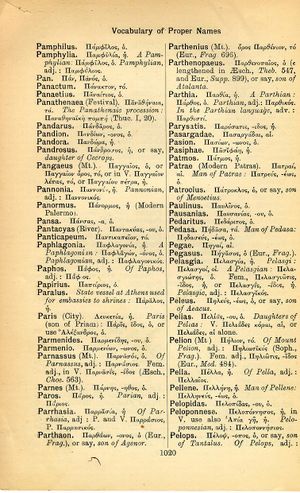Parthenopaeus: Difference between revisions
καλῶς γέ μου τὸν υἱὸν ὦ Στιλβωνίδη εὑρὼν ἀπιόντ' ἀπὸ γυμνασίου λελουμένον οὐκ ἔκυσας, οὐ προσεῖπας, οὐ προσηγάγου, οὐκ ὠρχιπέδισας, ὢν ἐμοὶ πατρικὸς φίλος → Ah! Is this well done, Stilbonides? You met my son coming from the bath after the gymnasium and you neither spoke to him, nor kissed him, nor took him with you, nor ever once felt his balls. Would anyone call you an old friend of mine?
(D_6) |
(Gf-D_6) |
||
| Line 1: | Line 1: | ||
{{WoodhouseENELnames | {{WoodhouseENELnames | ||
|Text=[[File:woodhouse_1020.jpg|thumb|link= | |Text=[[File:woodhouse_1020.jpg|thumb | ||
|link={{filepath:woodhouse_1020.jpg}}]]Παρθενοπαῖος, ὁ (ε lengthened in Aesch., ''Theb.'' 547, and Eur., ''Supp.'' 899), or say, <b class="b2">son of Atalanta.</b> | |||
}} | }} | ||
{{Lewis | {{Lewis | ||
Revision as of 07:43, 14 August 2017
English > Greek (Woodhouse)
Παρθενοπαῖος, ὁ (ε lengthened in Aesch., Theb. 547, and Eur., Supp. 899), or say, son of Atalanta.
Latin > English (Lewis & Short)
Parthĕnŏpaeus: i, m., = Παρθενοπαῖος,
I the son of Meleager and Atalante, one of the seven who went against Thebes: inclutus armis Parthenopaeus, Verg. A. 6, 480; Stat. Th. 4, 248; cf. Hyg. Fab. 99.
Latin > French (Gaffiot 2016)
Parthĕnŏpæus,¹⁶ ī, m. (Παρθενοπαῖος), Parthénopée [roi d’Arcadie, fils de Méléagre et d’Atalante, un des sept chefs qui assiégèrent Thèbes et périrent devant cette ville] : Virg. En. 6, 430 ; Stat. Th. 4, 248.

